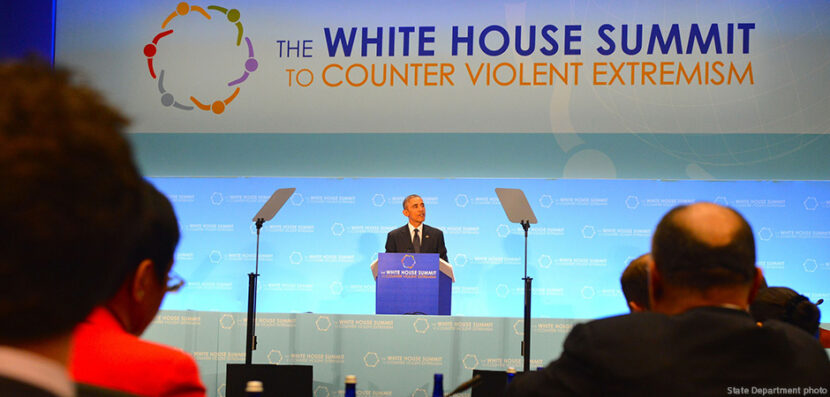
President Obama Delivers Remarks at the White House Summit to Counter Violent Extremism. Photo: State Department
Photo Credit: State Department
Ending a Cycle of Hate
The U.S. State Department recently hosted the Summit on Countering Violent Extremism at the White House. The purpose of the three-day event was to discuss ways to, “prevent violent extremists and their supporters from radicalizing, recruiting or inspiring individuals to commit acts of violence.” The summit was made up of panel discussions, individual speeches, and opportunities for small group interactions. Representatives from more than sixty countries were in attendance, including political, spiritual and community leaders.
Areas of Focus
With growing or continued threats from such known terrorist groups such as al Qaeda, Boko Haram, ISIL, al-Shabaab and the Taliban, it is necessary for countries to work together to develop concrete counter-measures. President Obama addressed those in attendance and identified some general strategies:
This includes military missions against known threats, working with partners in places where there is un-governed terrain (a growing safe haven for terrorists), sharing more intelligence, and making it more difficult to enter dangerous countries.
Oppression and denial of basic human rights feeds the notion that violence is the only answer. When certain groups feel that they cannot fully be part of a community, it leads to a cycle of fear and resentment and injustice that extremists exploit.
The president encouraged leaders to start sharing the truths of their faiths with one another in an effort to begin building bridges of trust.
Terrorist groups often use Islam to justify their violence because they are desperate for legitimacy. However, leaders must understand that it is very effective when aimed to appeal to disaffected youth. Combating religious propaganda will require leaders to push back against misrepresentations of sacred texts and by lifting up voices that promote tolerance.
While it is not a justifiable excuse, living in communities with no sense of order (whether through chronic impoverishment or government corruption) can lead to instability. This makes these areas hotbeds of recruitment into terrorist organizations. This can be confronted by expanding educational and economic opportunities in vulnerable regions, through effort sto reduce corruption.
Nations will not succeed without the contributions of their women. The president called on wealthier nations to do more and for emerging nations to create appropriate structures in order to be best assisted.
Reactions and Challenges
While many approved of the president’s desire to draw countries together in a common fight on terror, others were concerned about the “optics” (a political term that is sometimes used in the media to describe how things are perceived). One issue is that he was speaking to representatives from the world’s most repressive and least democratic nations. Some believe this weakens the president’s credibility and undermines any collective effort to make effective change. Another challenge is how to balance the fact that some of allied countries are more aggressive in how they define terrorist threats.
What Do You Think?
In his speech, President Obama mentioned a new youth organization called the
Chris Stevens Youth Network (named for the slain U.S. Ambassador).
Go to their Web site and determine if such a program appears to you. If so, explain why.
David Martin



